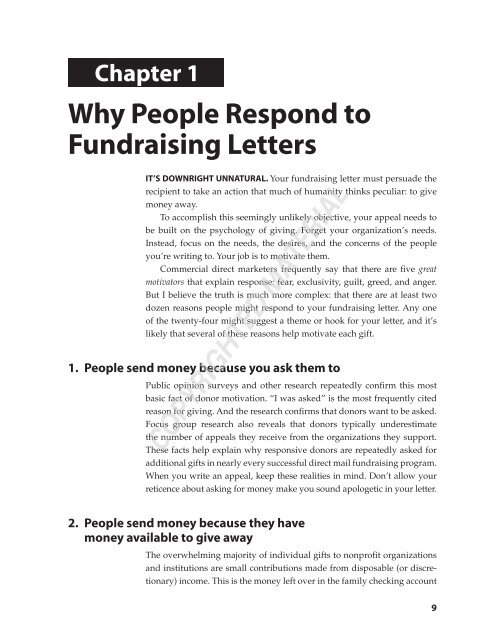Chapter 1 Why People Respond to Fundraising Letters - CASE
Chapter 1 Why People Respond to Fundraising Letters - CASE
Chapter 1 Why People Respond to Fundraising Letters - CASE
You also want an ePaper? Increase the reach of your titles
YUMPU automatically turns print PDFs into web optimized ePapers that Google loves.
<strong>Chapter</strong> 1<strong>Why</strong> <strong>People</strong> <strong>Respond</strong> <strong>to</strong><strong>Fundraising</strong> <strong>Letters</strong>IT ’ S DOWNRIGHT UNNATURAL. Your fundraising letter must persuade therecipient <strong>to</strong> take an action that much of humanity thinks peculiar: <strong>to</strong> givemoney away.To accomplish this seemingly unlikely objective, your appeal needs <strong>to</strong>be built on the psychology of giving. Forget your organization ’ s needs.Instead, focus on the needs, the desires, and the concerns of the peopleyou ’ re writing <strong>to</strong>. Your job is <strong>to</strong> motivate them.Commercial direct marketers frequently say that there are five greatmotiva<strong>to</strong>rs that explain response: fear, exclusivity, guilt, greed, and anger.But I believe the truth is much more complex: that there are at least twodozen reasons people might respond <strong>to</strong> your fundraising letter. Any oneof the twenty - four might suggest a theme or hook for your letter, and it ’ slikely that several of these reasons help motivate each gift.1. <strong>People</strong> send money because you ask them <strong>to</strong>Public opinion surveys and other research repeatedly confirm this mostbasic fact of donor motivation. “ I was asked ” is the most frequently citedreason for giving. And the research confirms that donors want <strong>to</strong> be asked.Focus group research also reveals that donors typically underestimatethe number of appeals they receive from the organizations they support.These facts help explain why responsive donors are repeatedly asked foradditional gifts in nearly every successful direct mail fundraising program.When you write an appeal, keep these realities in mind. Don ’ t allow yourreticence about asking for money make you sound apologetic in your letter.COPYRIGHTED MATERIAL2. <strong>People</strong> send money because they havemoney available <strong>to</strong> give awayThe overwhelming majority of individual gifts <strong>to</strong> nonprofit organizationsand institutions are small contributions made from disposable (or discretionary)income. This is the money left over in the family checking account9
10 How <strong>to</strong> Write Successful <strong>Fundraising</strong> <strong>Letters</strong>after the month ’ s mortgage, taxes, insurance, credit cards, and grocery billshave been paid. Unless you ’ re appealing for a major gift, a bequest, or amultiyear pledge, your target is this modest pool of available money.For most families, dependent on a year - round stream of wage or salaryincome, the pool of disposable income is replenished every two weeksor every month. That ’ s why most organizations appeal frequently and forsmall gifts. If your appeal is persuasive, your organization may join theranks of that select group of nonprofits that receive gifts from a donor ’ shousehold in a given month. If you ’ re less than persuasive or if competingcharities have stronger arguments — or if the family just doesn ’ t havemoney <strong>to</strong> spare that month — you won ’ t get a gift.For example, if you write me a letter seeking a charitable gift, you maysucceed in tapping in<strong>to</strong> the $ 100 or $ 200 I ’ ll probably have “ left over ” forcharity during the month your letter arrives. If your appeal is persuasive,I might send you $ 25 or $ 50 — $ 100 <strong>to</strong>ps — because I decide <strong>to</strong> add you <strong>to</strong>the short list of nonprofits I ’ ll support that month.Now you may have the mistaken impression that as a businessman, asnappy dresser, and an all - around generous fellow, I have a lot of money.You may even be aware I ’ ve occasionally made much larger gifts <strong>to</strong> localcharities. But you ’ re unlikely <strong>to</strong> receive more than $ 50 because that ’ s allI have available right now. Those few larger gifts I gave didn ’ t come frommy disposable income stream. They came from other sources (such as aninvestment windfall, a tax refund, or an inheritance) and required a lot ofplanning on my part.3. <strong>People</strong> send money because they ’ re inthe habit of sending money by mailCharity is habit forming; giving by mail is a special variety of this benignaffliction. When I became involved in direct mail fundraising in the late1970s, I was <strong>to</strong>ld that only about one in four adult Americans was mailresponsive — that is, susceptible <strong>to</strong> offers or appeals by mail. By the turnof the century, according <strong>to</strong> the Simmons Market Research Bureau, twoout of every three adults were buying goods or services by mail or phoneevery year. Many purchases involved telemarketing — but there ’ s no doubtAmericans are now more mail responsive.Surveys also reflect the growing importance of direct mail appeals inthe fundraising process. Research shows that fundraising letters are the <strong>to</strong>psource of new gifts <strong>to</strong> charity in America.
<strong>Why</strong> <strong>People</strong> <strong>Respond</strong> <strong>to</strong> <strong>Fundraising</strong> <strong>Letters</strong> 114. <strong>People</strong> send money because they suppor<strong>to</strong>rganizations like yoursYour donors aren ’ t yours alone, no matter what you think. Because theyhave special interests, hobbies, and distinctive beliefs, they may supportseveral similar organizations. A dog owner, for example, may contribute <strong>to</strong>half a dozen organizations that have some connection <strong>to</strong> dogs: a humanesociety, an animal rights group, an organization that trains Seeing Eye dogs,a wildlife protection group. A person who sees himself as an environmentalistmight be found on the membership rolls of five or six ecology - relatedgroups: one dedicated <strong>to</strong> land conservation, another <strong>to</strong> protecting the wilderness,a third <strong>to</strong> saving endangered species or the rain forest, and so on.There are patterns in people ’ s lives. Your appeal is most likely <strong>to</strong> bear fruitwhen it fits squarely in<strong>to</strong> one of those patterns.5. <strong>People</strong> send money because their gifts willmake a differenceDonors want <strong>to</strong> be convinced that their investment in your enterprise —their charitable gifts — will achieve some worthy aim. That ’ s why so manydonors express concern about high fundraising and administrative costs.It ’ s also why successful appeals for funds often quantify the impact of agift: $ 35 <strong>to</strong> buy a school uniform, $ 40 for a stethoscope, $ 7 <strong>to</strong> feed a childfor a day. Donors want <strong>to</strong> feel good about their gifts.Your donors are striving <strong>to</strong> be effective human beings. You help themby demonstrating just how effective they really are.6. <strong>People</strong> send money because gifts will accomplishsomething right nowUrgency is a necessary element in a fundraising letter. Implicitly or explicitly,every successful appeal has a deadline: the end of the year, the openingof the school, the deadline for the matching grant, the limited pressrunon the book available as a premium. But the strong attraction in circumstancessuch as these is best illustrated when no such urgent conditionsapply. If the money I send you this week won ’ t make a difference rightaway, shouldn ’ t I send money <strong>to</strong> some other charity that has asked for mysupport and urgently needs it?
12 How <strong>to</strong> Write Successful <strong>Fundraising</strong> <strong>Letters</strong>7. <strong>People</strong> send money because you recognizethem for their giftsYou appeal <strong>to</strong> donors ’ egos — or <strong>to</strong> their desire <strong>to</strong> heighten their publicimage — when you offer <strong>to</strong> recognize their gifts in an open and tangibleway: a listing in your newsletter; a plaque, certificate, lapel pin, or housesign; a screen credit in a video production; a press release. If your fundraisingprogram can provide appropriate and tasteful recognition, you ’ relikely <strong>to</strong> boost response <strong>to</strong> your appeals by highlighting the opportunitiesfor recognition in your letter or newsletter. Even if donors choose not <strong>to</strong> belisted in print or mentioned in public, they may be gratified <strong>to</strong> learn thatyou value their contributions enough <strong>to</strong> make the offer.8. <strong>People</strong> send money because you give themsomething tangible in returnPremiums come in all sizes, shapes, and flavors: bumper strips, gold tietacks, coffee - table books, membership cards, even (in one case I know) apint of ice cream.Sometimes premiums (such as name stickers or bookmarks) areenclosed with the appeal; these so - called front - end premiums (or freemiums)boost response more often than not and are frequently cost effective,at least in the short run. In other cases, back - end premiums are promised inan appeal “ as a <strong>to</strong>ken of our deep appreciation ” when donors respond bysending gifts of at least a certain amount. Either way, premiums appeal <strong>to</strong>the innate acquisitiveness that persists in the human race.9. <strong>People</strong> send money because you enable them <strong>to</strong>“d o something ” about a critical problem,if only <strong>to</strong> protest or take a standToday we are bombarded by information about the world ’ s problemsthrough a wide variety of channels. Although we may isolate ourselvesinside triple - locked homes, build walls around suburbs, and post guards atgateposts, we can ’ t escape knowing about misery, injustice, and wastedhuman potential. Often we feel powerless in the face of this grim reality.Charity offers us a way <strong>to</strong> respond — by helping <strong>to</strong> heal the sick or balmtroubled souls, imprint our values on a new generation, or feed the hungry.Your appeal will trigger a gift if it brings <strong>to</strong> life the feelings that move us <strong>to</strong>act, even knowing that action is never enough.
<strong>Why</strong> <strong>People</strong> <strong>Respond</strong> <strong>to</strong> <strong>Fundraising</strong> <strong>Letters</strong> 13If you offer hope in a world drowning in troubles, your donors willseize it like the life jacket it really is.10. <strong>People</strong> send money because you give them a chance <strong>to</strong>associate with a famous or worthy personThere are numerous ways that the identity, personality, or achievements ofan individual might be highlighted in a fundraising appeal. For example,that person may be the signer of the letter, the organization ’ s founder orexecutive direc<strong>to</strong>r, the honorary chair of a fundraising drive, a patron saint,a political candidate, an honoree at a special event — or simply one of theorganization ’ s members or clients. If the signer ’ s character or accomplishmentsevoke admiration or even simply a past personal connection, yourdonors may be moved <strong>to</strong> send gifts in response. The opportunity <strong>to</strong> associatewith someone who is well known or highly esteemed may offer donorsa way <strong>to</strong> affirm their noblest inclinations — or compensate for what theybelieve <strong>to</strong> be their shortcomings.11. <strong>People</strong> send money because you allow them <strong>to</strong> getback at the corrupt or the unjustThere are <strong>to</strong>o few outlets for the anger and frustration we feel on witnessinginjustice and corruption in society. Both our moral sense and thesecular law hold most of us in check, preventing expressions of violence orvocal fury that might allow us <strong>to</strong> let off steam. For many, contributing <strong>to</strong>nonprofit causes or institutions is a socially acceptable way <strong>to</strong> strike back.Whether your organization is a public interest group committed <strong>to</strong> fightingcorruption in government or a religious charity devoted <strong>to</strong> revealingdivine justice, it may help donors channel their most sordid feelings in<strong>to</strong> ademonstration of their best instincts.12. <strong>People</strong> send money because you give themthe opportunity <strong>to</strong> “ belong ” — as a member, friend, orsupporter — and thus you help them fight lonelinessYour most fundamental task as a fundraiser is <strong>to</strong> build relationships withyour donors. That ’ s why so many organizations use membership programs,giving clubs, and monthly gift societies. The process of solicitation itself canhelp build healthy relationships. Shut - ins, for example, or elderly peoplewith distant family and few friends may eagerly anticipate the letters yousend. Most of us are social animals, forever seeking companionship.
14 How <strong>to</strong> Write Successful <strong>Fundraising</strong> <strong>Letters</strong>13. <strong>People</strong> send money because you enablethem <strong>to</strong> offer their opinionsThe act of sending a gift <strong>to</strong> some nonprofit organizations might itselfconstitute a way <strong>to</strong> speak out. Consider, for example, the American CivilLiberties Union or the Republican National Committee or the HumanRights Campaign; support for these groups makes an obvious statementabout a donor ’ s views. But almost any charity can offer donors an opportunity<strong>to</strong> state an opinion by including in an appeal an involvement devicesuch as a membership survey, a petition, or a greeting card that might laterbe sent <strong>to</strong> a friend or family member. Although most donors may ignorethe chance <strong>to</strong> offer suggestions, they may regard the invitation <strong>to</strong> do so asa strong sign of your respect and concern for them.14. <strong>People</strong> send money because you provide them withaccess <strong>to</strong> inside informationEven if your organization or agency isn ’ t an institution of higher educationor a research foundation, you still hold knowledge many donors crave.Nonprofit organizations are often on the front lines of everyday, hands - onresearch, gathering important data day after day from clients, visi<strong>to</strong>rs, orprogram participants. Their staff members are likely <strong>to</strong> be specialists, andoften experts, in their fields.Every nonprofit possesses information that is not widely known <strong>to</strong> thepublic and that donors may perceive as valuable. A loyal supporter maybe vitally interested in the health and well - being of your executive direc<strong>to</strong>r(who was ill lately), the progress of a project you launched last year (after aspectacular start), or what your field staff learned last month (three monthsafter the hurricane).Disseminating inside information, which is intrinsically valuableand thus constitutes a gift from you, also helps build strong fundraisingrelationships by involving your donors in the intimate details of yourorganization.15. <strong>People</strong> send money because you help them learn about acomplex and interesting problem or issueIn most advanced industrial nations, the citizens think it is largely government’ s responsibility <strong>to</strong> provide funding for education, health care, and thearts. In contrast, the traditional American response has been <strong>to</strong> meet importantneeds such as these principally through private, voluntary action.Nonprofit organizations in the United States tackle issues or problems that
<strong>Why</strong> <strong>People</strong> <strong>Respond</strong> <strong>to</strong> <strong>Fundraising</strong> <strong>Letters</strong> 15society otherwise ignores or undervalues. Don ’ t think just of the privateschools and colleges, nonprofit hospitals, museums, and symphony orchestras.Think about Mothers Against Drunk Driving, Disabled American Veterans,Planned Parenthood, the Nature Conservancy, and the hundreds ofthousands of other organizations like them that are far less well known.Often these organizations are on the front lines of research or public debateon the most challenging, the most controversial, the most engaging issues.If that ’ s true of your organization, the emphasis you place in your appealon your special knowledge may help motivate donors <strong>to</strong> give.Your donors may even perceive the appeal itself as a benefit. As researchfrequently reveals, donors regard the letters they receive from charities asa source of special knowledge. I believe that helps explain why long letterscontaining hard facts and intriguing ideas often outpull more emotionalappeals.16. <strong>People</strong> send money because you help them preservetheir worldview by validating cherishedvalues and beliefsThe very act of giving affirms a donor ’ s dedication <strong>to</strong> a charity ’ s worthyaims. Donors support your organization ’ s work because you act on theirbehalf, pursuing your mission with time and effort they could never bring<strong>to</strong> bear themselves. In this passionate pursuit, you act out their values andbeliefs — the deep - seated convictions that lead them <strong>to</strong> join in your mission.But you must constantly remind them of the connection.If your organization ’ s mission is congruent with widely shared valuesand beliefs — a commitment <strong>to</strong> piety, for example, or saving dolphinsor promoting efficiency in government — you face an obvious marketingopportunity. But if your nonprofit is dedicated <strong>to</strong> an unpopular cause, suchas prisoners ’ rights, you possess a similar (if unenviable) advantage: forthat small number of donors willing <strong>to</strong> take a stand on an issue that othersreject, the values and beliefs that make the act of giving a form of personalaffirmation suggest <strong>to</strong> the fundraiser a language both may speak.17. <strong>People</strong> send money because you allow them <strong>to</strong> gainpersonal connections with other individuals who arepassionately involved in some meaningful dimension of lifeA charity is an intentional community of sorts — a cooperative venture, aninstitutional expression of a shared creed or common hopes. Your job asa fundraiser is <strong>to</strong> strengthen the bonds that tie your community <strong>to</strong>gether.
16 How <strong>to</strong> Write Successful <strong>Fundraising</strong> <strong>Letters</strong>Your greatest asset may be the heroic members of your field staff, whodaily risk their lives <strong>to</strong> right the world ’ s wrongs, or simply a particularperson within your community whom donors may regard as an inspiringexample: a selfless, dedicated staff member; a passionately committedtrustee; a model client or beloved beneficiary of your work. If youbring such people <strong>to</strong> life through your fundraising appeals, you enableyour donors <strong>to</strong> live vicariously through them — and that can be a meaningfuland rewarding experience for donors, as well as profitable for yourorganization.18. <strong>People</strong> send money because you give them thechance <strong>to</strong> release emotional tension caused bya life -t hreatening situation, a critical emergency,or an ethical dilemmaThe charitable impulse is often precipitated by special circumstances thatcause pain, fear, or even embarrassment. Consider the enduring popularityof memorial gifts <strong>to</strong> commemorate the passing of friends or loved ones orthe spontaneous outpouring of gifts <strong>to</strong> aid crime victims or the families ofkidnapped children. <strong>People</strong> want <strong>to</strong> help relieve pain and suffering, if onlybecause they share these feelings. And they want <strong>to</strong> respond <strong>to</strong> grave emergencies,if only because they fear death. Your appeal for funds may affordthem an opportunity <strong>to</strong> ease their affliction.19. <strong>People</strong> send money because they are afraidFear motivates. The American public has been subjected <strong>to</strong> billions offundraising letters expressly conceived <strong>to</strong> evoke fear. Fear of death. Fearof poor people or foreigners. Fear of Social Security benefit cuts. Fear ofhigher taxes. Fear of Democrats or Republicans, liberals or reactionaries.No Pollyannish view of human motivation can erase the evidencethat vast sums of money have been raised by such appeals. Fear sells.Yet I believe with all my heart that it ’ s often unseemly, at times ethicallyquestionable — and ultimately counterproductive — <strong>to</strong> use this obviousstratagem.Consider the would - be prophet who predicts Armageddon next year.Who will heed the prophet when next year has come and gone and theworld is still in one piece? A fundraiser who builds the case for giving onthe worst - case scenario may be building on quicksand.
<strong>Why</strong> <strong>People</strong> <strong>Respond</strong> <strong>to</strong> <strong>Fundraising</strong> <strong>Letters</strong> 1720. <strong>People</strong> send money because you allow them <strong>to</strong> relievetheir guilt about an ethical, political, or personaltransgression, whether real or imaginedGuilt undeniably plays a role in prompting some gifts. Think of the $1 or$ 2 cash contribution mailed in response <strong>to</strong> direct mail packages containingname stickers or greeting cards, the belated membership renewals that follow along series of increasingly insistent demands, or the millions of small gifts sentevery year in response <strong>to</strong> pho<strong>to</strong>graphs of skeletal children. Our complex societyallows few of us the luxury of acting out of purely ethical motives. Compromiseis woven through the fabric of our daily lives. The fact is that none of us islikely <strong>to</strong> feel guilt - free at any time. Sometimes giving <strong>to</strong> charity, like throwingcoins in<strong>to</strong> the poor box in an earlier era, will help release the pressure.Yet I believe guilt is highly overrated as a motiva<strong>to</strong>r. Rarely will donorswho are moved primarily by guilt prove loyal over the years, and largergifts from them are relatively rare. As a fundraising strategy, guilt may bejust as counterproductive in the long run as fear.21. <strong>People</strong> send money because you give them tax benefitsNo list of motivating fac<strong>to</strong>rs for charitable giving is complete without atleast passing reference <strong>to</strong> tax benefits. Without question, the charitable taxdeduction has played a major role in stimulating many large gifts and legacygifts, because the benefits <strong>to</strong> the donor are substantial. (This is particularlytrue of gifts of artwork or other forms of appreciated property <strong>to</strong> suchinstitutions as museums, because the tax laws are specifically structured<strong>to</strong> encourage such gifts.) However, many small donors mistakenly believethey <strong>to</strong>o gain a great advantage from the tax deductibility of their gifts.That ’s why it ’ s always advisable when requesting a gift <strong>to</strong> inform the donorthat it may be deductible: this information may not help, but it can ’t hurt.Still, it ’ s dangerous <strong>to</strong> construct an appeal exclusively on the basis oftax benefits, even an appeal <strong>to</strong> buy in<strong>to</strong> a tax - reduction program such as acharitable remainder trust. Experts in planned giving advise that donativeintent — the desire <strong>to</strong> help, <strong>to</strong> do good, <strong>to</strong> make a difference — is usually offar greater importance than any financial considerations. And there are lotsof tax - reduction schemes available <strong>to</strong> well - <strong>to</strong> - do people from institutionswith no charitable purpose whatsoever.22. <strong>People</strong> send money because they feel it ’ s their dutyMany of our religious traditions teach us that it ’ s wrong <strong>to</strong> live life withou<strong>to</strong>bserving our duty <strong>to</strong> others <strong>to</strong> relieve their pain, enlarge their opportunities,
18 How <strong>to</strong> Write Successful <strong>Fundraising</strong> <strong>Letters</strong>or brighten their lives. There is also a secular belief, widely shared in theUnited States, that as citizens in a democracy, we have an obligation <strong>to</strong> helpmake things better for our fellow citizens. Those who benefit from militarytraining may acquire a heightened sense of duty.Not every nonprofit organization can appeal explicitly <strong>to</strong> donors ’ senseof duty (though many charities can do so). But duty may nonetheless play arole in inspiring the gifts any nonprofit receives, for duty by its very natureis self - activating.23. <strong>People</strong> send money because they believeit ’ s a blessing <strong>to</strong> do soThe Christian belief that “ it is more blessed <strong>to</strong> give than <strong>to</strong> receive ” isdeeply ingrained in Western civilization and far from limited <strong>to</strong> practicingChristians. In the Jewish concept of mitzvah, for example, many Americansfind justification for believing that doing good is its own reward. Clearly —at least in our idealized vision of ourselves — we Americans celebrate thenotion of charity. Our self - image as “ nice people ” derives in no small partfrom our generous response <strong>to</strong> charitable appeals.24. <strong>People</strong> send money because they want <strong>to</strong>“ give something back ”Despite the growing gap between rich and poor in America — or moreproperly, because of it — the U.S. economy has spawned millions of millionaires,not <strong>to</strong> mention tens of millions of individuals who earn annualsix - figure salaries. Huge amounts of cash slosh around in the melting potthat is American society. Although most of that money buys ever - largerhomes and cars and increasingly contrived luxury goods, more each year isfinding its way in<strong>to</strong> the coffers of the nation ’ s one million nonprofit organizations.<strong>Why</strong>? Because many of those well - <strong>to</strong> - do people are motivated <strong>to</strong>share their good fortune with their communities or society at large. “ Givingsomething back ” is frequently cited by major donors as a principal reasonfor their gifts, and unquestionably it helps account for the generosity oftens of millions of less - prosperous donors.• • •Now that we ’ ve got a handle on two dozen of the reasons donors mightrespond <strong>to</strong> that fundraising letter you ’ re writing, let ’ s take a look at thedynamics at work when they find your letter in their mailbox.
















